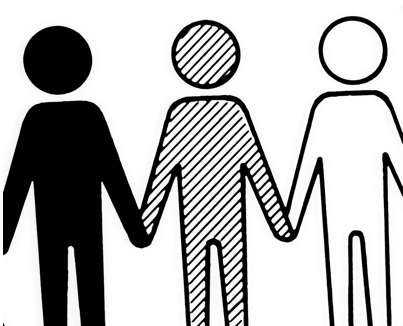RACISM: While irrational and inevitable, racism can still be fought if we act early.
By Amy Wang, Opinions Editor
It’s a topic either buried in your backyard or hanging on your front door: racism. While the general public consensus seems to be “racism is bad,” that doesn’t stop it from intruding into our personal lives daily, sometimes even without thought. People make mindless remarks every day about certain races, and slowly we allow those side comments to define our beliefs about a race as a whole.
Clarence Thomas, a Supreme Court Justice and notably the second African American to serve on the Court, commented during the past Black History Month, “Now, name a day [racism] doesn’t come up. Differences in race, differences in sex, someone doesn’t look at you right, someone says something. Everybody is sensitive.” But is sensitivity really the problem?
People have every right to be sensitive about their race when it is used to define and discriminate against them. If people allowed these remarks to slide off their shoulders, then we wouldn’t be where we are today. It is the people who hear these racist remarks, who see the injustice and say something, who write our history books – not the ones who sit back and look on with apathetic eyes.
Thomas only commented on a mere symptom of racism, not the cause. It’s not the victim’s fault for being sensitive towards blatant racism; it’s the bigoted perpetrator who needs to be chastised. Just this past Easter, an innocent egg hunt in Virginia led a family to find a white supremacist message hidden in an egg, calling diversity “white genocide.” Not much earlier this April, a boy and his grandfather were shot outside a Jewish community, a blatant act of extreme racism. The list of racist acts, unfortunately, keeps getting longer. There are even website forums dedicated to the hatred of one race or the superiority of another.
Racism is everywhere. Whether we acknowledge it or not, it’s there, sometimes in the extremes and sometimes in the subtleties. But it affects us all. It affects us politically, intellectually, and—most significantly and obviously—socially. There are wars over race; innocent people die because they were born a certain color, not because they chose that life. There is no legitimate reason for anyone to hate anybody of any race because race is one factor we cannot choose for ourselves; it is a factor that, while important to who we are, does not define us and should definitely not define how we are treated and looked upon as individuals.
There is no definite answer to “curing racism.” People are prone to prejudices. We are raised with our own beliefs that clash and cause misunderstandings, but that doesn’t mean we can’t do anything about it. Even if racism cannot be abolished entirely, we can take steps in our daily lives to say something when it happens.
Don’t let silly side remarks about race go unnoticed. Call people out on them – make them aware of their ignorance and encourage them to look at the scenario from the perspective of someone they are discriminating against. There are so many ways to build towards a better tomorrow if we, the youth of today, understand and sympathize with each other, regardless of race.
Make a decision for yourself. Don’t succumb to automatic prejudices; stop and think about what you say and how it affects those around you. Racism is a sensitive topic, yet it’s the only one we address in the extremes, even though cases of daily discrimination are just as newsworthy and concerning. If we can tackle the problem in our youth, when our minds are more open to different ideas, then maybe tomorrow the glaring results of racism won’t be as evident in society. We don’t need to all think alike to agree that equality and freedom are two rights everyone deserves, regardless of race.

